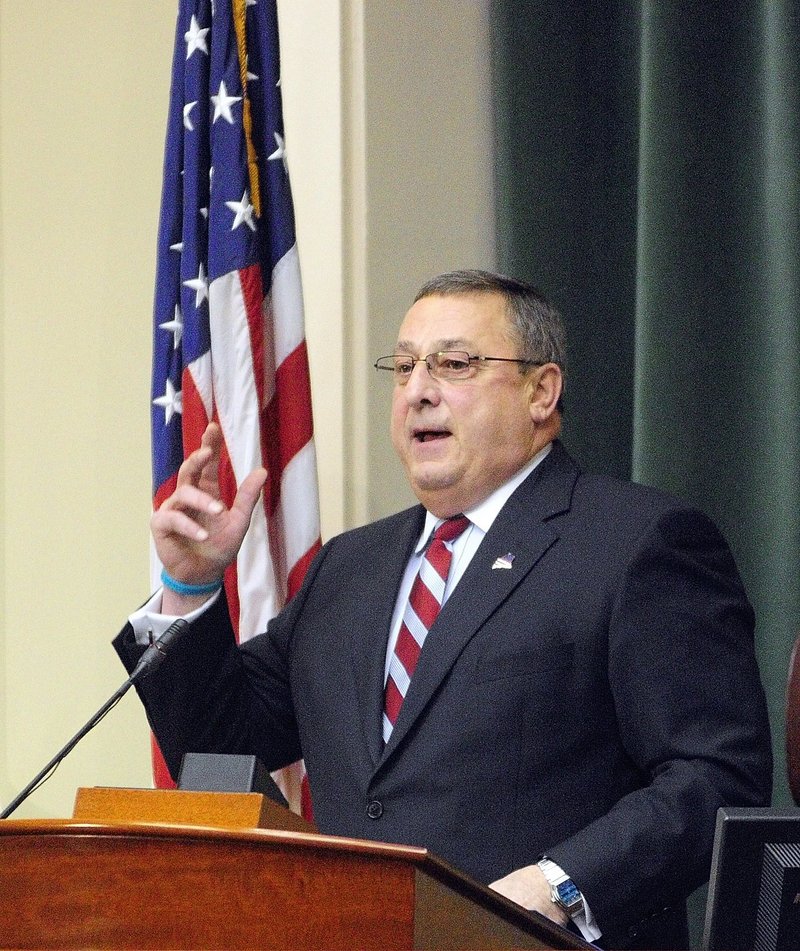Gov. Paul LePage’s blunt, straight-talking style and occasional ideological stubbornness have earned him both praise and disappointment among Mainers.
Polls conducted last month by the Maine People’s Resource Center and North Carolina-based Public Policy Polling put the Republican governor’s approval rating at 39 percent and 37 percent, respectively. Another poll, by Rasmussen Reports, said 47 percent approved of the job LePage was doing, although 38 percent strongly disapproved.
A recent Critical Insights poll commissioned by the Portland Press Herald/Maine Sunday Telegram did not survey LePage’s favorability, but the governor’s name did come up.
When asked an open-ended question about the one thing they were most concerned about when they think of Maine’s future, 7 percent of those polled said LePage. That was the third most common response, behind only a lack of jobs and the bad economy.
The poll also asked Mainers whether they agreed with LePage’s assessment of the state’s education system, specifically his comments that Maine students were seen as inferior by colleges outside of Maine. Only one-third agreed with LePage, while 56 percent disagreed.
With a month to go before the November election and more evidence emerging that LePage’s support is tenuous, his absence from the campaign trail is noteworthy.
“Governors overall, in the middle of a first term with a Legislature controlled by their party, you would expect to see them selectively campaign,” said University of Maine political scientist Mark Brewer. “I’m sure that there are some Republican candidates who wouldn’t want LePage anywhere near them, while others would love to have him there.
“I’d be very surprised if he’s not being asked; the question would be why he is saying no.”
Few Republican legislative candidates appear to be aligning themselves with the governor in any campaign literature. On the other side, Democratic candidates are using LePage and his political agenda to rally support.
Both parties in Maine view the 2012 legislative races as crucial to the state’s future. Republicans want to maintain the majority they gained in 2010 for the first time in decades because it will allow them to continue pursuing their agenda. Democrats, who controlled both chambers for years, have been uncomfortable being in the minority, particularly with a Republican governor.
“We’re not running against him, but more against the bad policies of the last two years,” said Lizzy Reinholt, spokeswoman for the Maine Democratic Party. “But he’s the figurehead, the ringleader.”
A recent television ad by a Democratic political action committee targeted five Republican Senate candidates for voting in lockstep with LePage during the 125th Legislature. Those candidates — Garrett Mason of Lisbon Falls, Tom Martin of Benton, Nichi Farnham of Bangor, Chris Rector of Thomaston and Lois Snowe-Mello of Poland — are seen as vulnerable by Democrats.
Maine Republican Party spokesman David Sorensen agreed that LePage is the “driving force” behind changes in state government but said Republican candidates are proud of those accomplishments.
“Our polling tells us that Mainers are very happy with what Republicans in Augusta have done over the past two years — from tax cuts to welfare reform to cleaning up state government,” he said. “That’s not to say there haven’t been disagreements between the governor and Republican legislators — there have. But together, they’re fulfilling the promises Republicans made to Maine voters two years ago.”
The Public Policy Polling poll showed LePage trailing a generic Democratic opponent for re-election by a 48-40 margin, although when he won in 2010, there also was a strong independent candidate, Eliot Cutler, in the race.
Democrats also lead Republicans on a generic legislative ballot by a 48-37 margin, some of which could be attributed to voters’ feelings about LePage.
In the Public Policy Polling survey, only somewhat conservative and very conservative voters approved of LePage. Only 35 percent of independents approved. Nearly 60 percent of self-identified moderates disapproved.
Only 29 percent of women approved of LePage, while 46 percent of men did. Similarly, women were much more likely than men to support a Democratic candidate in 2014. Men actually favor LePage by a 48-41 margin over a generic Democrat.
The age breakdown is telling, too. Voters aged 18 to 45 supported LePage over a generic Democrat in 2014, but voters 46 and older overwhelmingly would vote for a Democrat.
“In local races especially, Mainers always look past the party and look at the person, so it’s more important that our candidates are out there meeting with voters,” Reinholt said.
Brewer said Republicans may be reluctant to align themselves with LePage the person as opposed to LePage’s accomplishments, but many can run on the accomplishments of the 125th Legislature without mentioning the governor.
“He and Republicans got a huge amount of what they wanted. They were enormously successful in terms of sheer policy accomplishments,” he said.
If Democrats take one or both of the legislative chambers, Brewer said LePage would not be nearly as successful in his third and fourth years as he was in his first two.
Staff Writer Eric Russell can be contacted at 791-6344 or at:
erussell@mainetoday.com
Send questions/comments to the editors.


